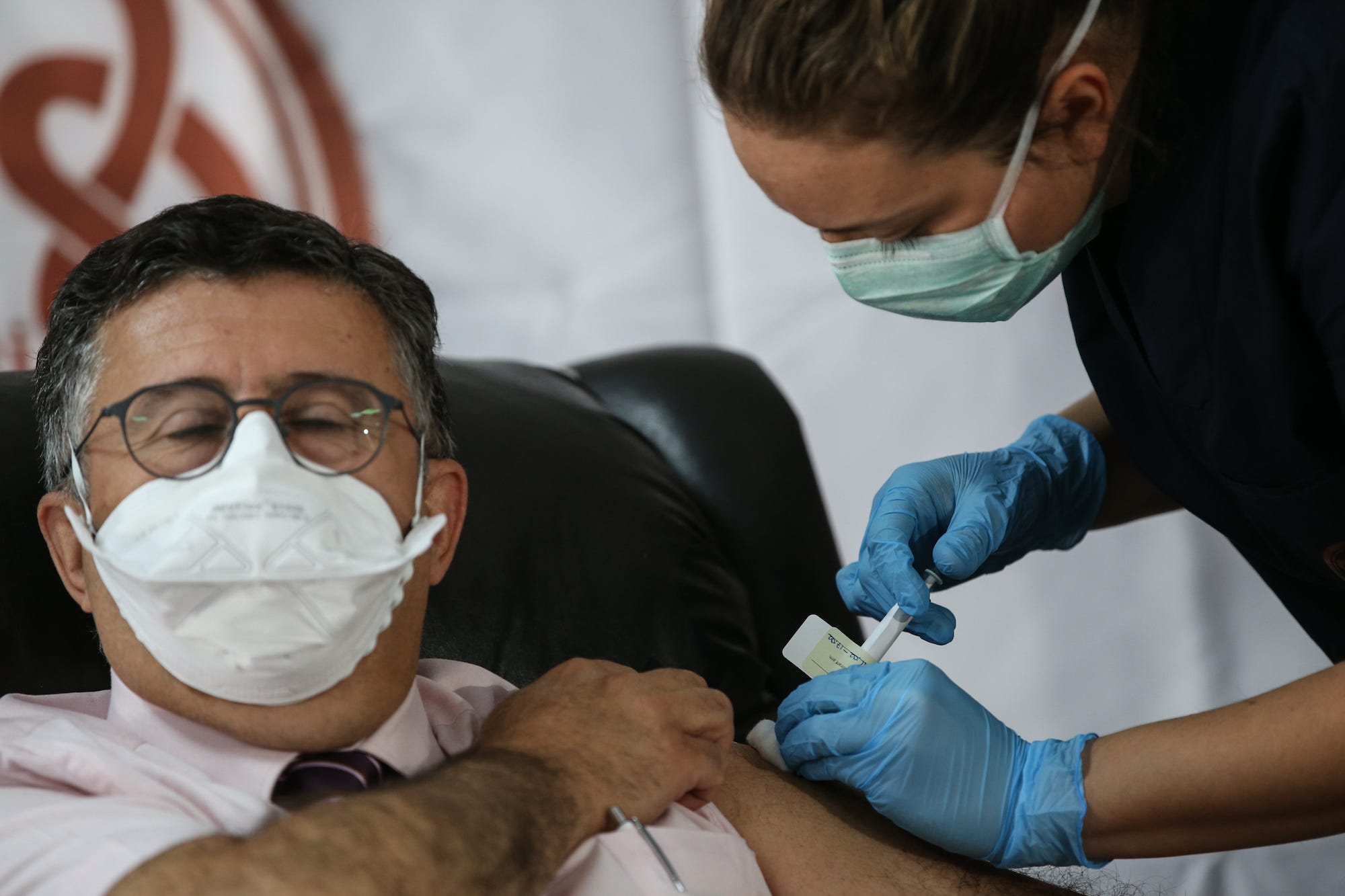
Dogukan Keskinkilic/Anadolu Agency via Getty Images
- The UK on Wednesday approved the COVID-19 vaccine developed by Pfizer and BioNTech, making it the first Western country to authorize a coronavirus shot.
- About 800,000 doses will arrive in the country within a week, meaning that 400,000 people could be vaccinated in the first wave, Matt Hancock, the UK’s health secretary told the BBC. The vaccine requires two doses, 21 days apart.
- Hancock said that “many millions” of doses of Pfizer’s vaccine could be available by the end of the year, but refrained from stating an exact amount.
- People in care homes and their carers are the highest priority for the vaccine, the government said, followed by anyone over 80 and frontline health workers.
- Visit Business Insider’s homepage for more stories.
The COVID-19 vaccine developed by the US pharma giant Pfizer and its German partner BioNTech was approved by the UK regulator on Wednesday – the first western country to give the green light to a coronavirus shot.
In a statement, the government said that the vaccine would be available within a week, and that care home residents and their carers would be first in line.
In total, the UK has ordered around 40 million doses of the two-shot vaccine, enough to immunize 20 million out of roughly 67 million people in the country. The two doses are given 21 days apart, and immunity kicks in seven days after the second dose.
How many people will be vaccinated first?
800,000 doses will arrive in the country next week from Belgium where Pfizer is producing the UK’s vaccine supply, Matt Hancock, the UK’s health secretary, told the BBC Wednesday. This means that 400,000 people will be vaccinated in the first wave of shots, he said.
“This will start small and ramp up,” Hancock said. “The vast majority of vaccinations we expect to be in the new year.”
Hancock said that "many millions" of Pfizer's vaccine doses could be available by the end of the year, but declined to state a precise figure.
"It depends on the speed of manufacture, and how quickly we can get the batch testing done to the rigorous and high standards. Then once it's in the UK we need to obviously distribute it throughout the NHS throughout all four nations," he said.
The vaccination process will take time, given that the vaccine requires two shots 21 days apart, Hancock added.
Who will be vaccinated first?
The UK government will prioritize who gets immunized with Pfizer's vaccine as it's deployed across the country.
The two-shot vaccine will first be made available to care home residents and their carers, people over the age of 80, and frontline healthcare workers, Hancock said.
"Then it essentially goes down the age range, also including the clinically extremely vulnerable," he added
The Joint Committee on Immunizations and Vaccinations, the clinical body that advises UK health departments, set out the details of this prioritization Wednesday.
The full priority list starts with elderly people in care homes and care home workers. Next are people over 80 and health and social care workers, followed by anyone aged over 75 and then over 70 years old.
The full priority list is here, starting with the highest priority:
- Residents in a care home for older adults and their carers.
- All those over 80 years of age and over. Frontline health and social care workers.
- All those 75 years of age and over.
- All those 70 years of age and over. Clinically vulnerable individuals.
- All those 65 years of age and over.
- All individuals aged 16 years to 64 years with underlying health conditions which put them at higher risk of serious disease and mortality.
- All those 60 years of age and over.
- All those 55 years of age and over.
- All those 50 years of age and over.
The government said that the prioritization partly depends on vaccine supply.
"I'm confident now, with the news today, that from spring — from Easter onwards — things are going to be better. We're going to have a summer next year that everybody can enjoy," Hancock said.
Pfizer and BioNTech announced November 18 that their vaccine candidate was 95% effective at protecting people against COVID-19 in its late-stage trial.
The pharmaceutical giants plan to deliver 50 million doses across the world by the end of 2020, with production ramping up to produce more than 1 billion in 2021.
Additional reporting by Dr. Catherine Schuster-Bruce.
